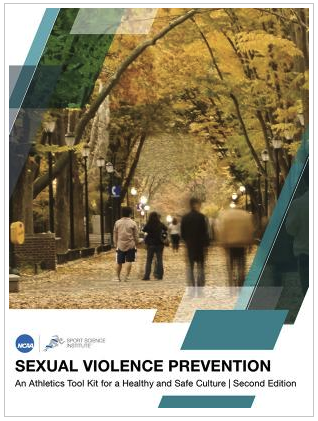NCAA’s Athletics Toolkit on preventing sexual assault and interpersonal violence
The NCAA Sport Science Institute recently released the second edition of their sexual violence prevention tool kit “An Athletics Tool Kit for a Healthy and Safe Culture.” This toolkit complements a previous version “Addressing Sexual Assault and Interpersonal Violence: Athletics’ Role in Support of Healthy and Safe Campuses.”
In the past few years, the NCAA (National Collegiate Athletic Association) has made significant contributions to sexual and intimate partner violence prevention by providing guidelines, toolkits, policies, curricula, and resources to support athletes, leadership, coaches, and athletic trainers. This new toolkit emphasizes the role everyone within an athletic department plays in preventing sexual and intimate partner violence on a campus and within communities.

“An Athletics Tool Kit for a Healthy and Safe Culture” centers the need for creating a campus culture free from violence which “values, respects and defends the dignity of all people and upholds the inherent value of each individual.” The NCAA identifies the intersections of violence and the spectrum on which it occurs, such as training coaches, athletes, leadership, and athletic staff on recognizing and stopping misogynistic, homophobic, marginalizing, and hostile language and identifying how this language contributes to violence on campus. It’s guidance and policies like this from the NCAA that moves the needle on prevention to a campus climate free of violence.
In addition to the sexual violence prevention education policy already in place, the NCAA recommends five core commitments for athletic departments to create a violence-free culture: 1. Leadership; 2. Collaboration; 3. Compliance and Accountability; 4. Education; and 5. Student-Athlete Engagement. It’s on everyone to prevent violence, and the NCAA tool kit makes that point clear, as well as providing clear and comprehensive checklists for each competency so athletic departments can monitor progress and identify next steps.
Having well-respected and wide-reaching organizations in the fight to end sexual violence makes our movement stronger. The continued leadership from NCAA solidifies the role sport has in preventing and ending sexual and intimate partner violence. This tool kit expands on that role and helps prevention practitioners and athletic departments cement their prevention practices to achieve our common goal: a culture without violence.
Download the “An Athletics Tool Kit for a Healthy and Safe Culture” and read more here.
